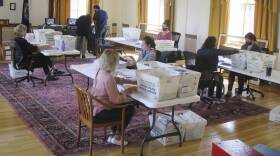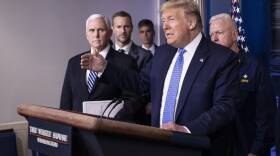EXPLORE MORE
Coming up Monday on BPR:
Boston Globe editor Brian McGrory
Business columnist Shirley Leung
Boston Medical Center’s Dr. Katherine Gergen Barnett
GBH’s Jared Bowen
Recent segments
-
Trump's Changed Stance On Masks 'Comes Too Late,' Says Art Caplan
The president tweeted a photo of himself wearing a mask on Monday, calling it 'patriotic.' -
Charles Stewart III Addresses Concerns Around Mail-In Voting
The elections expert said some states, like New York, need to do more to prepare themselves for an influx of mail-in ballots. -
John King Discusses The Return Of President Trump's Coronavirus Briefings
King called in to Boston Public Radio for his weekly national politics roundup. -
Yawu Miller: Renewed Support For Police Reform Is 'Night And Day' To The Past Few Years In Boston
Will sweeping police reforms make it through the legislature by the end of session? -
Trenni Kusnierek On MLB's Opening Day
Baseball is back, amid the pandemic, and Dr. Anthony Fauci will be throwing the first pitch on Opening Day. -
FRONTLINE Documents COVID-19's Hidden Toll
How have agricultural workers, many of them immigrants, been impacted by the coronavirus?
Listen to previous shows
-

Corby Kummer: Prince Edward Island "Spudpocalypse" an Opening for Local Farmers
Concern is growing over what the Boston Globe is calling a potential “spudpocalypse” threatening Massachusetts’ potato supply. Award-winning food writer Corby Kummer joined Boston Public Radio on Wednesday to explain whether Massachusetts residents might see a drop in potato stock at their local grocery stores. The spuds most at-risk are grown on Prince Edward Island (PEI), where farmers ship between 250 million to 300 million pounds of potatoes to the U.S. annually. According to the Globe, “Massachusetts residents consume an average of 75 million pounds of PEI potatoes each year, second only to Puerto Rico.” Lately, potato crops on Prince Edward Island have been decimated by potato wart, a fungus that poses no threat to humans but produces spores and appendages on potatoes. “It's been very bad for the [Prince Edward Island] potato industry; not all that bad for the Massachusetts potato supply,” Kummer said. “We have to be worried about Prince Edward Island farmers and their access to markets. They're hoping that Puerto Rico is going to reopen the market soon.” While potatoes from the island popularly known as the home of Anne of Green Gables may be harder to find in Massachusetts, local farmers should be keeping grocery store shelves full. “Western Mass has potato farms,” Kummer said. “So it's an opening for local potato growers.” Kummer is the executive director of the Food and Society policy program at the Aspen Institute, a senior editor at The Atlantic and a senior lecturer at the Tufts Friedman School of Nutrition Science and Policy. -

BPR Full Show: Testing, Testing
Today on Boston Public Radio: We open the show by asking listeners for their thoughts on the “Freedom Convoy” of truckers and conspiracy theorists protesting COVID-19 precautions and vaccine mandates. Art Caplan shares his thoughts on a recent neo-Nazi demonstration outside Brigham and Women’s Hospital that targeted two physicians for their efforts to make healthcare more equitable, as reported on by GBH senior investigative reporter Phillip Martin. Caplan is the Drs. William F. and Virginia Connolly Mitty Professor and founding head of the Division of Medical Ethics at NYU School of Medicine in New York City. Juliette Kayyem discusses the “Freedom Convoy” protests against vaccine mandates, and Senator Mitch McConnell’s pushback on the Republican National Committee labeling the Jan. 6 Capitol riots as “legitimate political discourse.” Kayyem is former assistant secretary for homeland security under President Barack Obama, and the faculty chair of the homeland-security program at Harvard’s Kennedy School of Government. Corby Kummer talks about the potato shortage that could hit New England, and the large restaurant chains that received federal pandemic assistance from the Small Business Administration. Kummer is the executive director of the Food and Society policy program at the Aspen Institute, a senior editor at The Atlantic and a senior lecturer at the Tufts Friedman School of Nutrition Science and Policy. Michael Curry shares his thoughts on Gov. Charlie Baker’s decision to lift a statewide school mask mandate on Feb. 28. Curry is president and CEO of the Mass. League of Community Health Centers. He’s also a Member of the National NAACP Board of Directors, where he serves as chair of the Board’s Advocacy & Policy Committee. Abbie Richards talks about her work combating misinformation on TikTok, and how conspiracy theories run rampant on platforms with little-to-no content moderation. Richards is currently working on her masters in climate studies, and is a co-founder of EcoTok, an environmental TikTok collective that specializes in social media-based climate communication. To wrap up the show, we ask listeners whether they’ve been rapid-testing before going on dates or meeting up with friends. -

BPR Full Show: Who Died and Made You Boss?
Today on Boston Public Radio: We start the show by opening phone lines, checking in with listeners about how their kids have been faring at school. Trenni Kusnierek talks about a decline in viewership during the Beijing Olympics, and tennis player Peng Shuai’s meeting with International Olympic Committee president Thomas Bach. Kusnierek is an anchor and reporter for NBC Sports Boston, and a BPR contributor. Imran Ahmed discusses the spread of misinformation on social media, and explains how social media platforms should combat misinformation online. Ahmed is CEO of the Center for Countering Digital Hate, an international not-for-profit organization working to stop the cycle of online hate and misinformation. Robert Lewis Jr. shares the latest on his community youth outreach work through the BASE. He also talks about his new role as the head of the Boys and Girls Clubs of Boston. Lewis Jr. is founder of The BASE in Roxbury, which he’s led for the past nine years. In March, he will become president of the Boys and Girls Clubs of Boston. Elle Simone Scott talks about some of her favorite recipes, and her journey in the traditionally male and white food world. Scott is Executive Editor and Inclusion Leader at America's Test Kitchen. She is also founder of the mentoring organization SheChef. Her forthcoming book, “Boards: Stylish Spreads for Casual Gatherings,” is out in April. John King updates us on the latest political headlines, focusing on the resignation of President Joe Biden’s top science adviser Eric Lander for workplace harassment. King is CNN’s chief national correspondent and host of Inside Politics Monday through Friday at noon. We then ask listeners for their bad boss stories. -

BPR Full Show: Let's Talk About "The Talk"
Today on Boston Public Radio: We begin the show by talking with listeners about the Republican National Committee labeling the Jan. 6 Capitol attacks as “legitimate political discourse.” U.S. Attorney Rachael Rollins discusses the decision to dismiss criminal charges against MIT professor Gang Chen, who was accused of hiding ties to China. She also talks about her priority of combatting human trafficking. Rollins is the U.S. Attorney for the District of Massachusetts, and the former Suffolk County District Attorney. Katie Murphy and Tami Hale talk about the burnout and staffing shortages facing nurses across the state. Murphy is president of the Massachusetts Nurses Association and a nurse at Brigham and Womens. Hale is a school nurse at Gates Lane Elementary School in Worcester. Emily Channell-Justice explains the foreign policy implications behind Russia’s threat to invade Ukraine, and what Ukrainian sovereignty means in the 21st century. Channell-Justice is the director of the Temerty Contemporary Ukraine Program at the Ukrainian Research Institute at Harvard. Their annual conference on Ukraine begins today, examining 30 years of Ukrainian sovereignty. Her study of the Ukrainian people, “Without the State: Self-Organization and Political Activism in Ukraine” is forthcoming. Revs. Irene Monroe and Emmett G. Price III share their thoughts on Joe Rogan’s apology for using the N-word in multiple podcast episodes, and racism in the NFL. Monroe is a syndicated religion columnist and the Boston voice for Detour’s African American Heritage Trail. Price is founding pastor of Community of Love Christian Fellowship in Allston, the Inaugural Dean of Africana Studies at Berklee College of Music. Together, they host GBH’s All Rev’d Up podcast. Kara Baskin talks about her recent column on how and when to have the “talk” with kids about sex. Baskin is a Food & Parenting writer for the Boston Globe, and a humor writer for McSweeney's. We end the show by opening the lines, asking listeners how they’ve had the “talk” with their kids. -

BPR Full Show: Quiz day!
Today on Boston Public Radio: We begin the show by asking listeners their thoughts on whether it’s time for workers to return to the office. Shirley Leung argues that businesses need to bring workers back in person, and discusses self-driving cars doing poorly in Southie. Leung is a business columnist for the Boston Globe. Billy Costa quizzes Jim and Margery on trivia questions, until they turn the tables and quiz Costa himself. Costa co-hosts Kiss 108’s Matty in the Morning, Dining Playbook on NESN and the host of GBH’s High School Quiz Show – season 13 of which will premiere on GBH 2 tomorrow at 6 PM. Andy Ihnatko weighs in on the Spotify controversy with Joe Rogan and Neil Young and other streaming options, and worries about the growing threat of deepfakes. Ihnatko is a tech writer and blogger, posting at Ihnatko.com. Melinda Lopez and Maurice Emmanuel Parent preview their one-man show about an actor who begins working as a teacher. Emmanuel Parent is an actor and the star of the fabulous one-man show Mr. Parent and a teacher at Tufts. Lopez is a playwright, actress and the writer of Mr. Parent. She also teaches theater and playwriting at Boston University and Northeastern University, in addition to being the inaugural Mellon Foundation playwright-in-residence at the Huntington Theatre Company. Sue O'Connell talks about former CNN president Jeff Zucker’s ousting over a secret office relationship, and Whoopi Goldberg’s misinformed comments on the Holocaust that led to her suspension from the View. O’Connell is the co-publisher of Bay Windows and the South End News, as well as NECN's political commentator and explainer-in-chief. We end the show by asking listeners their thoughts on office relationships following Zucker’s resignation from CNN.









